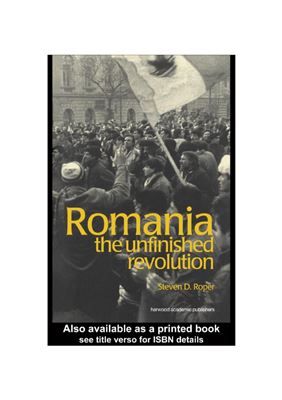Routledge, 2000. — 192 р. — (Postcommunist States and Nations). —
ISBN 90-5823-027-9
Книга посвящена предпосылкам и последствиям Румынской революции
1989 года, в том числе переходному периоду после свержения
Чаушеску. Автор рассматривает проблему с нескольких точек зрения и
дает оценку социальному развитию Румынии, становлению
капиталистической экономики и свободного рынка, отношениям с
национальными меньшинствами и т.д.
The Romanian revolution was motivated by a desire for greater
political and intellectual freedom and economic prosperity. It was
the bloodiest of the easte European transitions due to
Ceausescu's cult of personality. However, many of the goals of the
revolution are still unfulfilled. The lack of civil society,
charges of political corruption, the failure to transform the
economy, and conces over the protection of ethnic minority rights
are all factors in Romania's failure to become a fully integrated
European country.
Tracing the country's political history and examining Romania's postcommunist politics, economic transition and foreign policy, this book contemplates the prospects for this country as it enters the twenty first century.
Tracing the country's political history and examining Romania's postcommunist politics, economic transition and foreign policy, this book contemplates the prospects for this country as it enters the twenty first century.

